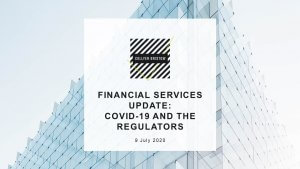- Banking & financial disputes
- Financial services
Background
In this case, a number of the Claimants applied for permission to provide the US Federal Bureau of Investigation (“FBI“) with copies of the Defendants’ disclosure material and the witness statements served earlier in the proceedings. That permission was sought in order to comply with a subpoena issued by the US District Court (“the Subpoena“).
Both the English proceedings and the US criminal investigation (which prompted the Subpoena) related to the acquisition of the First Claimant, Autonomy Corporation Limited, by the Second Claimant, Hewlett-Packard Vision BV, which was a wholly owned subsidiary of HPE. The acquisition was a failure and resulted in serious allegations of fraud against the Defendants. Following a lengthy criminal investigation in the US, one of the Defendants was ultimately convicted.
Issues
The Subpoena was not addressed to any of the Claimants, but rather to “The Custodian of Records, Hewlett Packard Enterprise (“HPE“)”, which operated in the US. However, HPE was the parent company of each Claimant, and as such, for the purposes of US corporate law, could arguably be treated as having control of all documents in its custody.
As the documents and witness statements requested under the Subpoena had not yet been referred to in open Court and/or put into evidence at a hearing, those documents could not be used for any collateral purpose without the Court’s permission (see CPR 31.22 and CPR 31.12).
The Claimants argued that permission ought to be granted, because non-compliance with the Subpoena would put them in potential contempt of the US District Court. On the other hand, the First Defendant contended that such permission should be refused, because the Claimants did not show “cogent and persuasive reasons” for doing so and because they had failed to satisfy the Court that releasing the material would not occasion injustice (or the risk of it).
The Subpoena was cast in broad terms, requiring the “Subpoena Recipient” to disclose “all responsive documents” in its “possession, custody or control” within the following categories:
- All documents produced by any party in English proceedings; and
- All witness statements produced by any party in those proceedings.
Decision
In delivering his judgment, Mr Justice Hildyard emphasised the Court’s role in preserving (as far as possible) a litigant’s right to confidentiality, and explained that in exercising its discretion to permit any collateral use of documents, the Court must be cautious and protective of that policy.
The case law in this area is well established. A Court will only relinquish the restrictions on collateral use where the Claimant demonstrates (a) special circumstances which constitute “cogent and persuasive reasons” for permitting the collateral use; and (b) that no injustice will flow to the person giving disclosure as a result.
In Mr Justice Hildyard’s view, the burden is such that it will usually be difficult, if not impossible, to obtain permission for collateral use unless some public interest exists in favour of that use which is stronger than the public interest and policy underlying the restrictions themselves. The most common policy factor relied upon in that regard is the public interest in investigating and/or prosecuting serious fraud or criminal offences.
Without the Court’s permission, the Claimants argued that that they would be placed in the unfortunate position of being unable to comply with their US law obligations and faced the very real prospect of sanctions. They submitted that it would be wholly unjust to trap them between a rock and a hard place.
The Court did not, however, consider that the “compulsion” of the Subpoena itself establishes a cogent and persuasive reason to give permission. As Mr Justice Hildyard stated, “the test is whether the use for which permission is sought justifies any exception to or erosion of the public interest which lies behind the rules”.
In making that assessment, the Court considered (amongst other things):
- whether the Subpoena actually placed the Claimants personally under any obligation to produce the requested documents (and exposed them to the risk of criminal penalty for non-compliance); and
- whether the Claimants’ documents are to be treated for these purposes as being in the control of HPE.
There was conflicting US evidence as to whether sanctions could be imposed by US Courts on the Claimants or only on their parent company. The Court accepted that a failure to comply by the Claimants would only affect the parent. As a result, since the Claimants were not under any clear compulsion because of the Subpoena, ultimately Mr Justice Hildyard was not persuaded that any “cogent and persuasive” reasons existed in favour of the collateral use, which would outweigh the public interests protected by CPR 31.22 and 32.12.
On that basis, the Claimants were denied permission to hand over any witness statements and disclosure material to the FBI.
Mr Justice Hildyard also commented briefly about the potential injustice that might otherwise arise if such permission were to be granted. Although not a direct issue in this case, attention was drawn to the possibility of third parties being implicated (e.g. if mentioned in a witness statement) and thereby being exposed to investigation or even prosecution in the US when otherwise they would not have been so. The Judge also noted that granting the requested permission might result in unsettling the imminent UK trial. For example, the necessary consultations with affected witnesses, the collation of documents and the need to seek advice about confidentiality would inevitably distract the parties from their trial preparations.
Comment
In light of the High Court’s decision, litigants in the UK must be careful to avoid disclosing, even to criminal or regulatory investigators, any documents obtained in the course of their dispute. A foreign issued subpoena will not automatically trump the prohibition against collateral use of any documents.












































































